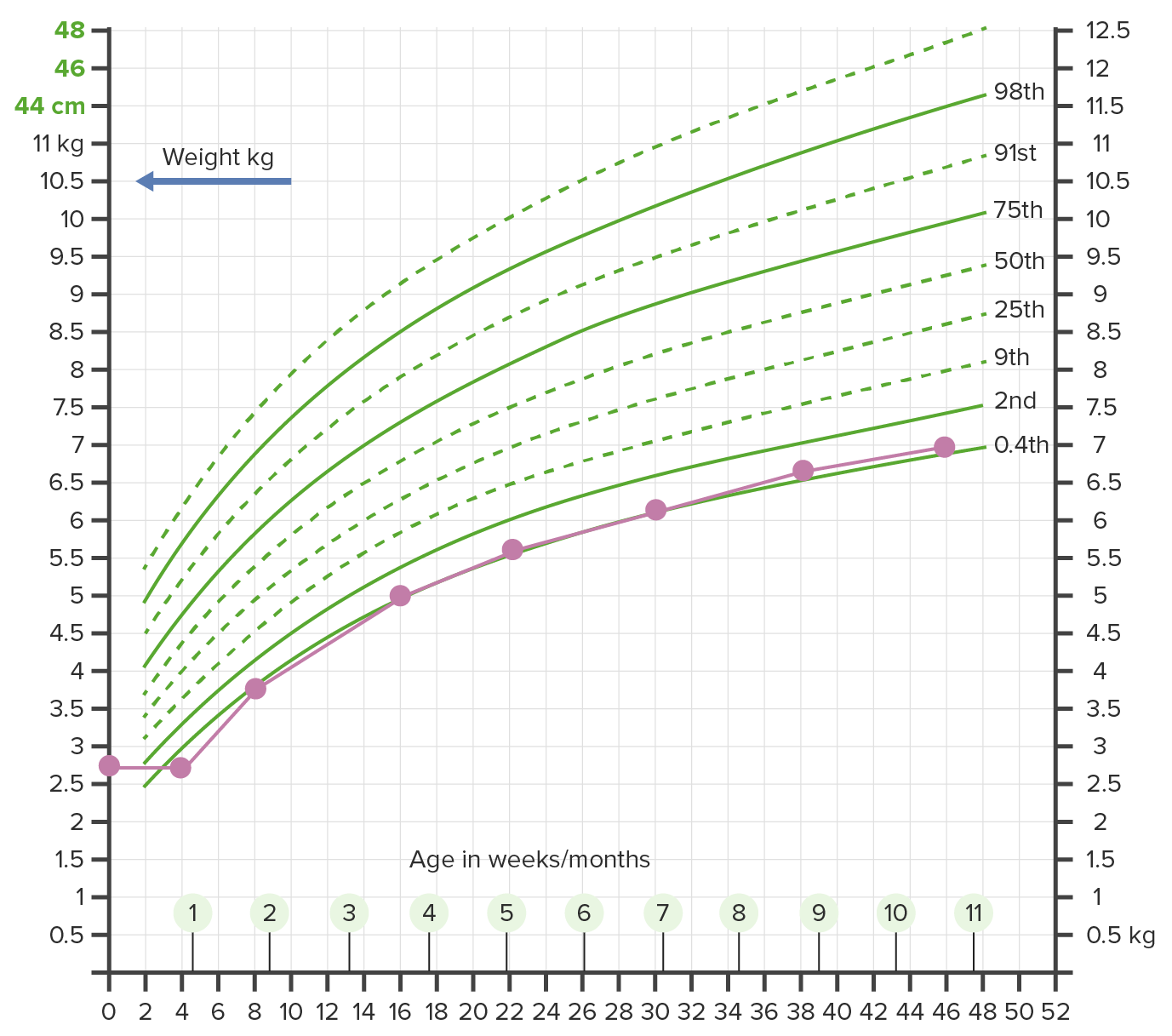Playlist
Show Playlist
Hide Playlist
Failure to Thrive (FTT): History & Physical Exam
-
Slides FailuretoThrive Pediatrics.pdf
-
Download Lecture Overview
00:02 So you see a child with failure to thrive. 00:04 There’s this enormous list of things that this might be. 00:08 What do you do to try and parse down what is the problem in these children? First is, as always, take a good history. 00:17 So it’s critical to get a good perinatal and prenatal history so you can understand whether this child has problem that are rendering them unable to grow. 00:28 An example would be did they sustain a TORCH infection or a congenital infection that’s resulting in having a difficulty with growing. 00:36 Obviously in the history, we need a growth and developmental history. 00:40 We need to get all those growth chart points and find out when exactly this child stopped growing and why because that may give us clues as to etiology. 00:49 And critical is understanding what is this child’s dietary habits. 00:54 How often do they feed? How much do they feed? What do they feed upon? These are all critical elements of the dietary history. 01:04 A review of systems is important because like we showed in previous slides, there are so many different diseases that this could be that fully understanding everything that’s going on with these children is a key to developing a clue as to what the problem is. 01:20 Family history is important because many of these conditions are inherited. 01:24 And so we may get a clue as to what’s going on. 01:27 And lastly, and this is most important, psychosocial factors. 01:32 Remember, child neglect is the number one cause of failure to thrive in infants and understanding how the parents relate to their child is important. 01:41 Many parents who aren’t relating well to their child will be reluctant to discuss this with the doctor for fear of being turned in for child abuse or child neglect. 01:51 So asking unobtrusive and not very invasive questions that get at this is important. 01:57 Questions like, “How is your baby to get along with?” can be very revealing. 02:03 Next, we do a thorough physical exam. 02:05 Do a thorough physical exam that’s going to get at one of these underlying medical conditions. 02:10 And remember things like vitamin deficiencies may be a clue to a malnutrition problem. 02:18 For example, if a patient has signs and symptoms of a fat soluble vitamin deficiency, that a clue that they’re having a problem with absorption. 02:29 Next, we sometimes get labs in these kids, but not always. 02:34 And let me just me pause right here and discuss what we typically do. 02:38 So oftentimes in these children, because psychosocial reasons are so common for infants with failure to thrive, we will admit the child to the hospital with no labs whatsoever, do a thorough history and physical exam. 02:53 And if nothing’s obvious, we will watch them in-house and simply feed the child and watch them grow and get daily weights. 03:00 If the infant is gaining weight in the hospital it’s a great clue that there is not an organic problem fuelling this child’s inability to gain weight. 03:10 But if a child is not gaining weight in a supervised setting, then we might have to worry about what else could be going on and we start obtaining labs. 03:20 We might get a CBC to look for anemia, we would get serum electrolytes to look for chronic acidosis or some other cause. 03:29 Renal tubular acidosis is an unusual cause of failure thrive in some infants. 03:34 We might check renal or hepatic functions on labs, LFTs, the BUN and creatinine to get a sense of whether there’s some organic failure that is underpinning this failure to thrive. 03:48 And remember, chronic infections are a cause and if you had to choose one infection that can go below the radar, it’s the urinary tract infection. 03:56 So often, we’ll check a urinalysis and a urine culture. 04:01 Sed rate and CRP is helpful for understanding if there’s an underlying problem such as cancer or infection. 04:09 The tTG is our clue to celiac disease. 04:13 And we’ll get an IgA level with that to make sure that it’s not artificially low from the low IgA level. 04:19 And then also, rarely, we’ll worry about the hormones that are driving growth. 04:25 One thing that people sometimes forget during the first year of life, the primary hormone responsible for growth is not growth hormone. 04:36 During the first year of life, the primary hormone is the thyroid hormone. 04:40 And after that, the growth hormone takes over. 04:43 So in infants under a year of age, thyroid hormone is our first thing we go for and in older children who have stopped growing, we worry about growth hormone deficiency.
About the Lecture
The lecture Failure to Thrive (FTT): History & Physical Exam by Brian Alverson, MD is from the course Pediatric Gastroenterology.
Included Quiz Questions
What is the first thing to do when you see a patient with severe failure to thrive?
- Take a good history to understand the possible etiology
- Get a CBC to test for anemia
- Check serum electrolytes
- Assess hepatic function and renal function
- Check for renal tubular acidosis or chronic UTI with a urinalysis
During the first year of life, what is the primary hormone responsible for growth and development?
- Thyroid hormone
- Growth hormone
- Cortisol
- Insulin
- Aldosterone
Which of the following is the most significant factor in Failure to Thrive (FTT)?
- Neglect
- Genetic factors
- Infections
- Feeding habits
- Dietary choices
Customer reviews
5,0 of 5 stars
| 5 Stars |
|
1 |
| 4 Stars |
|
0 |
| 3 Stars |
|
0 |
| 2 Stars |
|
0 |
| 1 Star |
|
0 |
Very easy to understand!!! I can listen to the lecture even while doing other things, and I am able to absorb and retain the information. I also like the friendly approach. Thank you Dr. Brian Alverson!!!




